Merchant Of Venice Act 2 Scene 9 Questions And Answers
ICSE SolutionsSelina ICSE SolutionsML Aggarwal Solutions
EnglishMathsPhysicsChemistryBiology
Act 2 Scene 9 Merchant Of Venice Workbook Important Questions and Answers
Passage – 1 (Act II, Sc.IX, Lines 19-52)
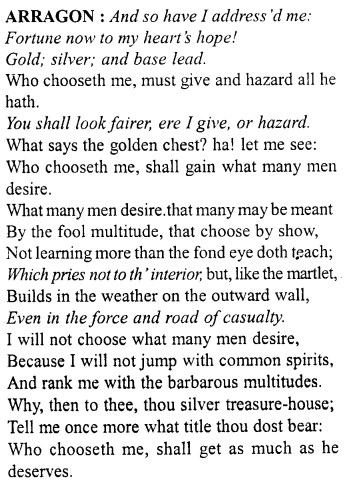
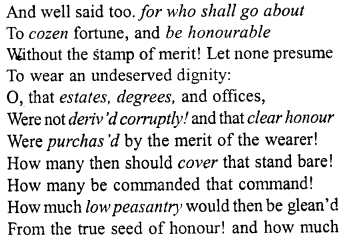
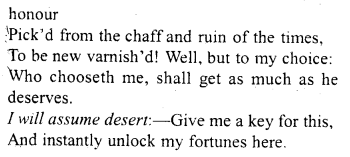
Paraphrase :
ARRAGON : And I have prepared myself like that. Fortune now Lead me to my heart’s hope! Gold, silver, and base lead.” Who chooses me must give and gamble all he has.” You shall look more beautiful before I give or gamble. What says the golden chest? Ha! Let me see:” Who chooses me shall gain what many men desire.” What many men desire! that “many” may mean The foolish multitudes, that choose by outward appearance, Not learning any more than their loving eyes teach, Which doesn’t go to the inside but, like the marten, Builds on the outside wall in any weather, Even in the force of wind and on the road to ruin. I will not choose what many men desire, Because I will not jump with common spirits And rank myself with the barbarous multitudes. Why, then to you, you silver treasure-house; Tell me once more what title you bear:” Who chooses me shall get as much as he deserves.” And it is said well too, because who shall go about To steal a fortune, and still be honorable Without the stamp of deserving it? Let no one pretend To wear an undeserved dignity. Oh! that fortunes, degrees, and offices Were not earned by corruption, and that clear honors Were purchased by the merit of the wearer! How many then would be covered that stand naked; How many would be commanded that command; How much low peasantry would then be taken from From the true seed of honor; and how much honor Picked from the garbage and ruin of the times To be newly painted! Well, to n¥y choice:” Who chooses me shall get as much as he deserves.” I will assume I am deserving. Give me a key
Word Meaning With Annotation
And so have I address’d me : and I have prepared myself accordingly. Fortune now to my heart’s hope : he addresses the Goddess of fortune. Gold; silver; and base lead : the use of the word “base” reveals that Arragon starts in the same mistaken attitude that Morocco showed. Arragon is immediately prejudiced against the leaden casket, because the metal of which it is made is not so showy and attractive as silver or gold. Evidently the intention of Portia’s father, when he arranged the trial of the caskets, was that the inscriptions alone should be the proper test. The different metals would only serve to mislead men who paid too much attention to outward show and appearance. You shall look fairer, ere I give, or hazard : he falls into the same error as Morocco, and does not realize that the hazard is to be made for Portia, not as he says for lead, fond : foolish. Which pries not to th’ interior : which does not search for the inner meaning of anything, martlet : let martin, a species of swallow, which builds a nest of mud against the outer walls of houses. Even in the force and road of casualty : “open to disaster, and in the very path of danger.” for who shall go about : who shall attempt, cozen : “to cheat”, be honourable : “attain to honours.” estates : Here it is mean “positions of dignity”, degree : “high mark”, derived corruptly : granted from unworthy motives; sold, clear honour : unstained or innocent honour, purchased : obtained. There is no reference to buying in the usual sense, cover : keep their hats on. low peasantry : “base fellows”. This shows the habit which had crept in, during the middle ages, of thinking of two great classes, the upper classes or nobility who were men of honour, and the lower classes who were base cultivators of the soil. I will assume desert: I shall be content with what I deserve.
Read the above passage and answer the following questions
Question 1.
On what condition is the Arragon willing to give or hazard for the sake of the lead casket?
Answer:
Arragon is willing to do so if the lead casket improves its appearance.
Question 2.
How does he interpret the word “many”?
Answer:
By the word “many” Arragon means the silly, common people who are guided by the outward appearance of things.
Question 3.
What is martlet? How does it behave?
Answer:
A marlet is a bird like the swallow. It builds its nest on the outward wall of a house. Its nest is exposed to strong winds and storms. Its behaviour is unwise.
Question 4.
Why does not Arragon like to choose what many men desire?
Answer:
He does not do so because he does not agree with the ordinary people. He would not like to place himself at par with the uncivilised and ill-mannered crowds of people.
Question 5.
What is Arragon’s opinion about the inscription on the silver casket?
Answer:
Arragon thinks that the inscription on the silver casket is absolutely correct. The inscription reads that the chooser will get as much as he deserves. He thinks that no one can cheat fortune and get an honourable position without giving proof of his merit.
Passage – 2 (Act II, Sc.IX, Lines 64-78)
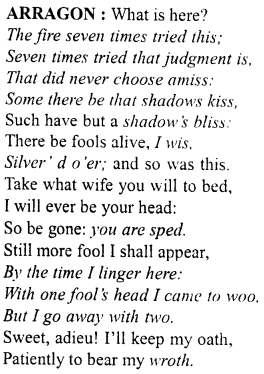
Paraphrase :
ARRAGON : What is this here?” The fire tried this seven times. The judgment that never chose wrong Is tried seven times. There are some men that shadows kiss; Men like this have only a shadow’s bliss; There are fools alive, I know. That are silvered over, and so was this chest. Take whatever wife you want to bed, I will be your head forever: So be gone; you are finished.” I shall appear to be more foolish By the time 1 stay here; I came to court with one fool’s head, But I go away with two. Sweetheart, goodbye! I’ll keep my oath, Patiently to deal with my anger.
Word Meaning With Annotation
The fire seven times tried this : “this” refers to the silver. The line refers to the words from the Bible. Some there be that shadows kiss : “shadow” is here used generally as being the reverse of “substance” i.e., some people- neglect the sound and substantial things of life to pursue empty shows, shadow’s bliss : “unreal happiness.” I wis : this is a corrupted form of the Old English word “Gewiss” which later became “Y-wiss” and meant “Certainly!” silvered o’er : “whose folly is concealed by their silvery hairs.” you are sped : your business is completed. By the time I linger here : the longer I remain here. With one fool’s head I came to woo, But I go away with two : I came here a fool, and I depart a double fool, wroth : misfortune. Not the usual sense of “anger”.
Read the above passage and answer the following questions
Question 1.
What in your opinion has been tried seven times in the fire?
Answer:
Silver has been tried seven times in the fire.
Question 2.
What judgement according to the Arragon has fool-proof correctness?
Answer:
A judgement that has been tried seven times.
Question 3.
What do those people who shadows gain?
Answer:
Those people gain only unreal happiness.
Question 4.
Where were these words written, “Take what wife you will to bed. I will ever by your head?”
Answer:
These words were written on the piece of paper that Arragon found in the silver casket.
Question 5.
What fate did Arragon meet?
Answer:
Arragon failed to choose the right casket. He felt disappointed.
Passage – 3 (Act II, Sc.IX, Lines 77-82)
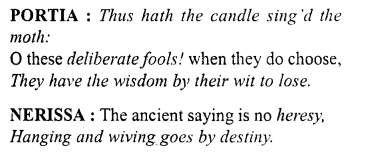
Paraphrase :
PORTIA : In this way, the candle has burned the moth. Oh, these deliberate fools! When they choose, They have the wisdom to lose by their senses.
NERISSA : The ancient saying is no lie:” Hanging and getting a wife are up to Fate.”
Word Meaning With Annotation
Thus hath the candle sing’d the moth : Arragon is here compared to a foolish insect that has fluttered around a bright light, and has been burnt, deliberate fools : deliberating fools, in the sense that they calculated too much. The right choice depended not on skillful reasoning, but on love, which should have been prepared to “hazard all he hath”, they have the wisdom by their wit to lose : “They have enough sense, at any rate, to allow their small minds to lead than astray”, heresy : falsehood, hanging and wiving goes by destiny : “Wedding is destiny, and hanging likewise”.
Read the above passage and answer the following questions
Question 1.
What is the occasion for the above quoted dialogue?
Answer:
The Prince of Arragon has made a wrong choice by choosing the silver casket. After he leaves with his train Portia comments on him and men like him.
Question 2.
How does Portia react to the failure of Prince of Arragon in choosing a right casket?
Answer:
Portia is delighted at the defeat of Prince of Arragon. This shows that he is not the man of her choice and she is not keen to marry him.
Question 3.
Who are the ‘deliberate fools’ referred to in the first speech of the above quoted dialogue?
Answer:
Portia uses the phrase ‘deliberate fools’ for her suitors. She considers her suitors foolish who make wrong choices by resorting to deliberate reasoning.
Question 4.
Explain the speech of Portia in the above quoted dialogue?
Answer:
In the above mentioned lines Portia compares the Prince of Arragon to a moth and the shining of the silver casket to the light of a candle. Just as a Moth attracted by the light of a candle approaches it and gets itself burnt, similarly the Prince of Arragon who is attracted by the shining of silver and the seeming fairness of the inscription on the silver casket chooses it and shows himself to be a fool. He is quickly disposed of like the burning of the moth by the flame of the candle. Portia feels that her foolish suitors resort to lengthy reasoning in order to make their choice and they make a wrong choice precisely because of what they believe to be their wisdom.
Question 5.
Explain the meaning of the second speech in the above quoted dialogue?
Answer:
In the above mentioned speech Nerissa quotes an ancient proverb. She means that it is not wisdom or our own choice which can bring us good fortune or misfortune. Destiny or some force beyond us decides whether a man will live or be hanged and whether he will get married or not.
Merchant of Venice Workbook Questions and Answers
- Merchant of Venice Act 1 Scene 1 Workbook Answers
- Merchant of Venice Act 1 Scene 2 Workbook Answers
- Merchant of Venice Act 1 Scene 3 Workbook Answers
- Merchant of Venice Act 2 Scene 1 Workbook Answers
- Merchant of Venice Act 2 Scene 2 Workbook Answers
- Merchant of Venice Act 2 Scene 3 Workbook Answers
- Merchant of Venice Act 2 Scene 5 Workbook Answers
- Merchant of Venice Act 2 Scene 6 Workbook Answers
- Merchant of Venice Act 2 Scene 7 Workbook Answers
- Merchant of Venice Act 2 Scene 8 Workbook Answers
- Merchant of Venice Act 2 Scene 9 Workbook Answers
- Merchant of Venice Act 3 Scene 1 Workbook Answers
- Merchant of Venice Act 3 Scene 2 Workbook Answers
- Merchant of Venice Act 3 Scene 3 Workbook Answers
- Merchant of Venice Act 3 Scene 4 Workbook Answers
- Merchant of Venice Act 3 Scene 5 Workbook Answers
- Merchant of Venice Act 4 Scene 1 Workbook Answers
- Merchant of Venice Act 5 Scene 1 Workbook Answers
